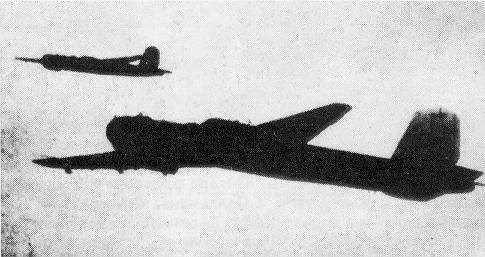|
The He 177 served as a five/six-seat heavy bomber from 1942 to 1945.
The Greif (Griffin) was the only long-range heavy bomber built by the
Luftwaffe in World War II in significant numbers. It was, to the good
fortune of the Allies, one of the most trouble-plagued and
accident-prone aircraft in existence, and the German crews and ground
staff did not like it either. The plane was desgined to meet a
misguided and impossible goal of 1938 that not only demanded long range
with heavy bomb load and a speed of 536km/h but also required the big
bomber to be able to divebomb. This and many other difficulties caused
great delays and added to the weight. The designers wanted to use neat
remotely controlled guns but this was a big problem and eventually it
had to be discarded in favor of the ordinary turrets or hand-aimed
guns. Worse yet, it was decided to use four engines and pack them in
two coupled pairs to reduce drag, so that the He 177 looked like a
twin-engined aircraft. Although great efforts were made by
Daimler-Benz to make the 2,950hp DB 610A twinned units work properly,
they created numerous problems and caught fire so often that - like an
aircraft of World War I - the big Heinkel was dubbed "the flaming
coffin." In total more than 1,000 of many versions were built. Armed
with various combinations of 20mm cannon, 13mm heavy machine guns and
rifle-caliber guns, the He 177 carried up to 6,011kg of bombs or
missiles, and in some types even went into action at "nought feet" as
tank-busters carrying huge 50 or 75mm caliber cannons. Late in the war
some new versions, like the He 274 built in France and He 277 in
Austria, had four separate engines, but they were too late to have any
significant influence in the course of the war. |




